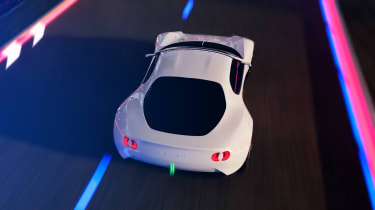Mazda has given us a fresh taste of its future, issuing a business update revealing the brand’s strategy for the remaining decade. As you’d expect, a rollout of a range of electrified vehicles will form the bulk of the company’s work leading up to 2030, but Mazda has decided to capture this path to electrification with an eye-catching, but rather mysterious new concept car.
It’s called the Mazda Vision Study Model. It’s showcased prominently as the figurehead of Mazda’s 2030 plans, but no information about the car – which remains a digital concept for now, with no evidence of a physical model – has been published.
We’ve seen new sports car concepts from Mazda before, the most prominent of recent times being the 2015 RX-Vision. That car previewed a potential revival of the ‘RX’ line-up discontinued in 2012 with the demise of the RX-8. Like its RX forebears, the Vision-RX uses Wankel power, with a 2.6-litre quad-rotor engine located under the long bonnet. But the ‘will-they, wont-they’ running commentary as to production viability has gone quiet, since the industry’s rapid move to electrification.
Perhaps, then, that’s why this new Mazda ‘Vision’ is necessary. Mazda believes that 40 per cent of its sales globally could be fully-electric by 2030, and beyond then the company is also considering investing in its own battery production infrastructure.
It’s one of a number of technologies the firm is developing in what it calls its “multi-solution” approach leading up to 2030, which will also include new internal combustion models, exploring carbon-neutral fuels, and new hybrid technology before its “full-fledged” launch of a range of electric cars.

Tellingly, the Vision Study concept is not painted in the brand’s trademark Soul Red but a clean white, pointing to the future. The design of the car is a nod to the past in many ways though, with some clear influence from the FD RX-7.
The shape of the doorline where it meets the rear wheel arch is very reminiscent of Mazda’s performance icon of the 90s, as is the shape of the rear windscreen, while a more subtle nod to that car can be found in the lighting front and rear. At the back, the two semi-circles are akin to the taillight signature of the FD RX-7, while more tellingly at the front, the headlights are very subtly popped up.
No further details are available for now, but the green running light at the rear of the car is another nod to the concept’s eco credentials. The proportions of the vehicle also look more compact than the Vision-RX concept of 2015.
Mazda has used its ‘Vision’ cars in the past as barometers of where the brand’s ‘Kodo’ design ethos is going, so while we may not see a direct production version of the Vision Study anytime soon, let alone a physical model, we could perhaps see some elements of its design on Mazda production cars later this decade.
Now read our list of the best sports cars…


